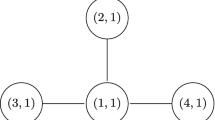Abstract
To make their cost structure more efficient, firms often pool their critical resources: small divisions of a large firm may negotiate a joint contract to benefit from volume discounts; or firms may outsource their call centres to an independent provider who is able to increase utilization by reducing variability since demand is now pooled. Since pooling demand reduces total joint costs, an immediate question is how the realized savings should be shared. We model the problem as a cooperative game and use the resulting allocation schemes to distribute the savings. One popular scheme is the Shapley Value, which always exists and, we show, represents each player's incremental value to the pool. When the pooled savings depend on the sum of each player's demand, we label the game coalition symmetric and propose, for those games, an algorithm that makes pseudo-polynomial the computation of the Shapley Value.
Similar content being viewed by others
References
Owen G (1995). Game Theory. Academic Press: New York.
Dubey P, Mas-Colell A and Shubik M (1980). Efficiency properties of strategic market games: an axiomatic approach. J Econ Theory 22: 339–362.
Cornes R and Hartley R (2003). Aggregative public good games. NajEcon Working Paper Reviews 666156000000000063, www.najecon.org.
Corchón LC (1994). Comparative statics for aggregative games The strong concavity case. Math Soc Sci 28: 151–165.
Hax AC and Candea D (1984). Production and Inventory Management. Prentice-Hall: Englewood Cliffs.
Myerson RB (1991). Game Theory, Analysis of Conflict. Harvard University Press: Cambridge.
Shubik M (1962). Incentives, decentralized control, the assignment of joint costs and internal pricing. Mngt Sci 8: 325–343.
Osborne MJ and Rubinstein A (1994). A Course in Game Theory. The MIT Press: Cambridge.
Littlechild SC and Owen G (1973). A simple expression for the Shapley Value in a special case. Mngt Sci 20: 370–372.
Author information
Authors and Affiliations
Corresponding author
Rights and permissions
About this article
Cite this article
Reinhardt, G., Dada, M. Allocating the gains from resource pooling with the Shapley Value. J Oper Res Soc 56, 997–1000 (2005). https://doi.org/10.1057/palgrave.jors.2601929
Received:
Accepted:
Published:
Issue Date:
DOI: https://doi.org/10.1057/palgrave.jors.2601929



